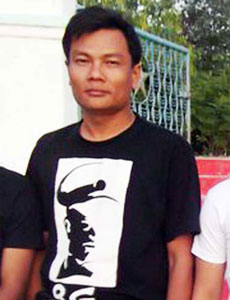(Editorial) – The verdict was like a slap in the face—10 years in jail.
Just when people were lulled into thinking the new Burmese government was showing openness, a special court in the notorious Insein Prison sentenced a blood donation group volunteer—pushed into the court in a wheelchair—for breaking the Electronics Act.

Former Burmese army captain Nay Myo Zin sentenced to 10 years in prison for possessing an e-mail critical of the military. Photo: Youth Network For PeopleIn a closed hearing on August 26 that his family was barred from attending, Nay Myo Zin, a former army officer, was sentenced to a lengthy prison term for possessing an e-mail critical of the military on his computer.
The verdict came just a day after UN envoy Tomas Ojea Quintana left Burma after a five-day visit in which he talked with the government about releasing political prisoners and was even allowed to visit Insein Prison, claiming conditions had improved. According to The New Light of Myanmar, the government indicated to Quintana a willingness to release some of the prisoners, though they were at pains to point out that Burma has “no political prisoners,” only prisoners who had committed crimes.
Quintana has long made a nuisance of himself with the Burmese authorities calling for the release of political prisoners. Right now there are said to be 1,995 people in prison in Burma whose only crime was to act out what the UN charter on human rights says should be universal––freedom of speech and conscience. But they were convicted by archaic laws that the authorities use to keep the people silent.
The case of Nay Myo Zin had been in process for four months and the judge was unlikely to be swayed by the recent real-politic of a government trying to show a clean face. Clearly, there is a disconnect between officials chasing down people who have broken Burma’s unjust laws and the leadership of President Thein Sein eager to burnish his country’s image on the world stage.
Superficially, change is in the air. The president recently met Burmese opposition leader Aung San Suu Kyi in Naypyitaw and her recent meetings with government minister Aung Kyi held a glint of promise that the government was willing to turn over a new leaf and consider reconciliation. Suu Kyi claimed the discussions had been “constructive.” There has even been talk of Suu Kyi’s National League for Democracy being allowed to re-register as a political party after its dissolution by the authorities.
But is this all smoke and mirrors?
Quintana, in a statement as he exited Burma, said “the government has taken a number of steps that have the potential to bring about an improvement in the human rights situation” in Burma. Note that word “potential.” No action yet.
Nay Myo Zin’s case is a reminder that it is “business as usual” for Burma’s rulers. The blood donation volunteer is no big league activist. The story is that he fell over in prison and injured his back. But given the nasty tales of brutality in Insein Prison, the question is whether the fall was accidental. More to the point, there should be fears for his health, given he fractured his lower vertebrae, which could leave him in a wheelchair for the rest of his life if not handled properly.
Just what was Nay Myo Zin’s crime? Possessing an e-mail critical of the Tatmadaw, a criticism of his former military colleagues?
Burma’s newly-elected government is propped up by the 2008 Constitution—offering the army the right to step in when they wish—and by the generals living behind their high walls in Naypyitaw who have a manic fear of dissension in their ranks.
So Nay Myo Zin’s case may be used as an example of what happens to those who try to stir up dissent in the military.
All this gives pause to question whether the recent meetings and photo opportunities are all a game.
Just because the president deigns to meet with Suu Kyi does not mean there will be meaningful change in a system designed to keep the generals living in luxury.
Nay Myo Zin’s case is a chilling reminder to the people not to step out of line.



